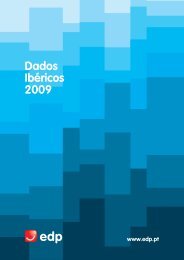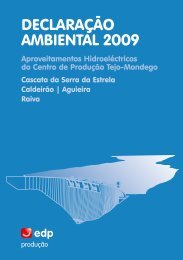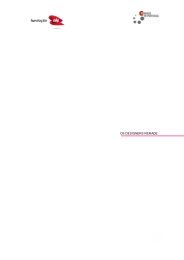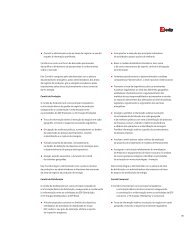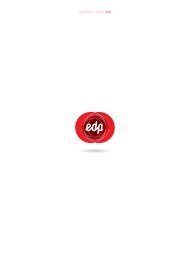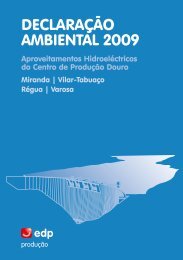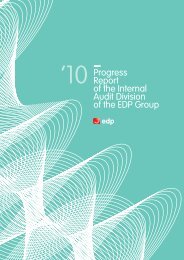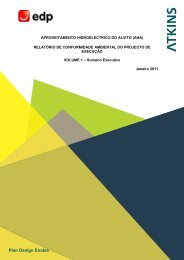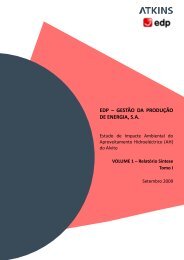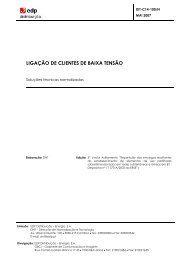: performance :<strong>EDP</strong> brasilGENERATION unit 2012 2011 2010 2009Number of Generating Groups* # 40 39 39 39Hydroelectric power plants (UHE) # 14 14 14 14Small Hydroelectric power plants (PCH) # 25 25 25 25Thermoelectric power plants (UTE) # 1 0 0 0Installed Capacity at December 31* MW 1,974 1,790 1,735 1,733Lajeado MW 903 903 903 903Peixe Angical MW 499 499 452 452Mascarenhas MW 194 189 181 181Suiça MW 34 34 34 34Mini-Hydro MW 165 165 165 164Pecém MW 180 0 0 0Net Generation* GWh 8,217 7,873 7,263 6,893Lajeado GWh 3,711 3,655 3,205 3,169Peixe Angical GWh 2,839 2,653 2,523 2,093Mascarenhas GWh 776 705 674 846Suiça GWh 106 174 118 54Mini-Hydro GWh 758 687 742 731Pecém GWh 26 0 0 0* Excludes Wind** Includes supply customers and own consumptionGENERATION PORTFOLIO (MWh)1,733 1,7353784529033804529031,7903894999031,9743931804999032009 2010 2011 2012LAJEADO PEIXE ANGICAL PECÉM OTHERSAVAILABILITY (%)93.191.891.296.893.892.483.661.12009201020112012DISTRIBUTION unit 2012 2011 2010 2009Electricity Distributed GWh 24,923 24,544 23,749 21,313Bandeirante GWh 14,793 14,726 14,310 13,292Escelsa GWh 10,130 9,818 9,439 8,021Number of customers (Supply Points) # 2,933,927 2,831,659 2,740,447 2,667,701Regulated** # 2,933,715 2,831,514 2,740,345 2,667,611Bandeirante # 1,601,301 1,545,199 1,502,815 1,482,355Escelsa # 1,332,414 1,286,315 1,237,530 1,185,256Liberalised # 212 145 102 90Bandeirante # 143 98 82 73Escelsa # 69 47 20 17Grid structure indicatorsExtension km 87,344 85,749 84,636 82,289Substations # 135 135 129 122Tranformation Stations # 198,142 193,212 188,121 180,272LAJEADO PEIXE ANGICALMASCARENHAS SUIÇANET GENERATION (GWh)7,8738,2176,8937,2631,5651,6401,5351,6302,5232,6532,8392,0933,169 3,2053,655 3,7112009 2010 2011 201226DEC - Average length of interruptions per customerBandeirante hours 9.4 9.4 12.2 12.8Escelsa hours 9.9 10.4 9.1 11.4FEC - Average frequency of interruptions per customerBandeirante # 6.0 6.2 7.1 6.4Escelsa # 6.4 6.3 6.3 6.9** Includes supply customers and own consumptionLAJEADO PEIXE ANGICAL PECÉM OTHERSDISTRIBUTED ELECTRICITY (TWh)21.38.023.79.424.5 24.99.810.113.314.314.7 14.8SUPpLY unit 2012 2011 2010 2009Electricity supply in Brazil GWh 135,952 118,627 64,414 56,249Enertrade GWh 11,254 9,895 8,263 8,715Others GWh 124,698 108,732 56,150 47,534Enertrade Customers # 252 137 86 1202009 2010 2011 2012BANDEIRANTEESCELSA<strong>EDP</strong> - <strong>Annual</strong> <strong>Report</strong> 201257
: performance :“GestãoTransparente.org”InitiativeAs part of a diverse group ofcompanies, <strong>EDP</strong> participates inthis collaborative project for theidentification, prevention andmanagement of corruption risks inorganisations, under the auspices ofthe Council for Corruption Prevention.The project is aimed at the businesscommunity in general and is availableonline with free access for all.The Practical Corruption RiskManagement Guide is an interactivetool incorporating a simulator forexposure to corruption risks –based on the characterisation of thecompany using it, its operations andthe markets it operates in. Dependingon the results, the guide makes a setof recommendations for corruptionrisk management measures at thediagnostics, guidance, interventionand monitoring levels.This practical tool also offerspertinent information, documentationand legislation for corruptionprevention and management, as wellas daily updated news on events,studies or interventions relating to thesubject matter. The guide is availableat http://gestaotransparente.org andis also hosted on the Council forCorruption Prevention website.3.2. ethics3.2.1. ethics in edpEthics and integrity are indispensable conditionsfor achieving the sustained success of thebusiness strategies defined and for the exerciseof responsible citizenship – areas in which <strong>EDP</strong>aims to continue to lead by example.The principles and values that guide our operationsare defined in the public commitments we havevoluntarily undertaken, the policies and procedureswe adopt and, more comprehensively, in the <strong>EDP</strong>Code of Ethics.It is on the basis of these principles and values thatwe assess the ethical dimension of actions carriedout by <strong>EDP</strong> personnel or by third parties actingin its name in any business area or geographicarea in which the <strong>EDP</strong> Group operates.The objectives of ethics management at <strong>EDP</strong>are: to guarantee a high degree of ethicalawareness and standards at the individual level;to minimise the risk of bad ethical practices;to maintain a business culture with the valuesundertaken that generates transparency, trustin business relationships and accountability forthe consequences of the decisions made and actscarried out.During 2012, a significant number of actionsaimed at consolidating and strengthening theethical culture in the <strong>EDP</strong> Group were carriedout on the basis of these three main guidelines:Consolidating the internalethics management systemThe Corporate Governance and SustainabilityCommittee of the General and SupervisoryBoard approved the review of the Code of EthicsRegulations and the Internal Regulations of the<strong>EDP</strong> Group Ethics Committee in response to theindentified needs for improvement. Work on therevision of the <strong>EDP</strong> Code of Ethics has since begunand should be completed in the first half of 2013.Mr. José Figueiredo Soares took office asthe <strong>EDP</strong> Group Ethics Ombudsman, replacingMr. Carlos Loureiro.With the aim of clarifying and consolidating theguiding principles in matters of competition andanti-trust practices, the “Commitment to HealthCompetition Practices” document was published;it is available at www.edp.pt> about edp>principles and policies.Still in 2012, <strong>EDP</strong> was included in the 2012World’s Most Ethical Companies ranking bythe Ethisphere Institute (http://ethisphere.com).Also, in its SAM assessment, <strong>EDP</strong> was givena leading position for the “Codes of Conduct/Compliance/Corruption&Bribery” criterion(www.sustainability-index.com).Accompanying the improvement in the supplychain management, for the first time <strong>EDP</strong>included assessment criteria related withintegrity management and bribery and corruptioncontrol procedures in its supplier registrationand qualification phases. For more information,please see page 80.Strengtheningthe ethical cultureThe training programme integrated in the éticaedpProgramme was completed, with <strong>EDP</strong> Renováveisclosing the cycle. A specific module wasdeveloped to be included in the initial trainingfor new employees and work was begun onpreparing the training/awareness raising ofsuppliers in the supply categories that areconsidered as high risk in terms of integrity58and ethics. Both initiatives should be totallyoperational in Portugal in the first half of 2013and be subsequently scaled for the business unitsin the remaining geographic areas in which theGroup operates.Promoting good practicesin business ethicsIn the context of corruption and briberyprevention actions, <strong>EDP</strong> participates in the“Gestão Transparente.org” (TransparentManagement) initiative. This initiative aimedat capacitating organisations in corruption riskassessment in specific business contexts anddisseminating the applicable legislation and goodpractices in this area.Furthermore, in the context of influence onsociety, <strong>EDP</strong> business ethics practices and,in particular, the éticaedp Programme, havebeen the object of public analysis and debatein the programme for the International MBA at theCatólica Porto Business School, in course workat the Instituto Superior de Economia and Gestãoin Lisbon and at the Portuguese Associationfor Quality’s 37th Quality Colloquium heldin Guimarães.As part of the AESE/<strong>EDP</strong> Chair of Ethics inBusiness and Society, a cycle of debate sessionswas held in Lisbon on the theme of “SustainableDevelopment: Businesses and Society”, as wellas a seminar on “Corruption and Mismanagement”.Also in the scope of this chair, the book Éticapara Dirigentes e Administradores [Ethics forExecutives and Managers] (edições AESE, Lisbon,2012) by Prof. Pe. Pedro Regojo was published.3.2.2. the work of theethics ombudsmanThe Ethics Ombudsman dealt with ethicalcomplaint processes, in line with the powers andcompetences attributed to the office in the Codeof Ethics Regulations (see page 107 and 108).F1EVOLUTION OF THE NUMBER OF COMPLAINTSBY SUBJECT (No.)165185RelationshipwithCustomersand Suppliers2011Conductin the workplace2011 201204HumanRightsand equalopportunities120EnvironmentandSustainability2IntegrityEthicsand LegislationEthics complaints are classified in accordancewith the Code of Ethics. In 2012, a total of 208complaints (an increase of 3.4% over 2011) werereceived through the various ethics complaintscommunication channels made available by the<strong>EDP</strong> Group.Of all the complaints lodged, 27% originated inPortugal, 28% in Spain and 45% in Brazil.Of these, only 15 resulted in processes submittedto the <strong>EDP</strong> Ethics Committee in accordancewith the regulatory provisions. The remainingcomplaints were dealt with expeditiously by thebusiness units in question as they did not involvesignificant ethical issues.A World Full Of Energy820
- Page 1:
Impresso em papel elaborado com cel
- Page 6 and 7:
: edp :index6 edp6 message to share
- Page 8 and 9: : edp :EDP - Annual Report 20127
- Page 10 and 11: Portugalrenewablesgás7,194 Employe
- Page 12 and 13: : edp :1.1.3. CORPORATEBODIESboard
- Page 14 and 15: : edp :1.1.5. principles ofsustaina
- Page 16 and 17: : edp :BRAzILEDP Brasil distinguish
- Page 18 and 19: : edp :1.3.2. Operating HighlightsU
- Page 20: : edp :1.3.5. ENVIRONMENT INDICATOR
- Page 24 and 25: : edp :strategicframeworkxxxxxxxxxx
- Page 26 and 27: : strategic framework :Reconversion
- Page 28 and 29: : strategic framework :EVOLUTION OF
- Page 30 and 31: : strategic framework :million at D
- Page 32 and 33: : strategic framework :Since 2005,
- Page 34: : strategic framework :EDP - Annual
- Page 38 and 39: : a edp :performance38 business40 I
- Page 40 and 41: : performance :EDP - Annual Report
- Page 42 and 43: : performance :By the end of the ye
- Page 44 and 45: : performance :electricity generati
- Page 46 and 47: : performance :EDP Distribuição h
- Page 48 and 49: : performance :electricity AND GAS
- Page 50 and 51: : performance :Despite the increase
- Page 52 and 53: : performance :electricity supply i
- Page 54 and 55: : performance :In 2012, EDPR increa
- Page 56 and 57: : performance :3.1.3. EDP BRAsILEDP
- Page 60 and 61: : performance :Distribution of comp
- Page 62 and 63: : performance :testing the adherenc
- Page 64 and 65: : performance :3.4.1. managementsys
- Page 66 and 67: : performance :In Brazil, EDP has n
- Page 68 and 69: : performance :that 117 m 3 of oil
- Page 70 and 71: : performance :EDP has undertaken t
- Page 72 and 73: : performance :encourages professio
- Page 74 and 75: : performance :The set of indicator
- Page 76 and 77: : performance :Voice of the custome
- Page 78 and 79: : performance :(ACAPO), are also av
- Page 80 and 81: : performance :3.7. suppliersThe pe
- Page 82 and 83: : performance :Transparency; Leader
- Page 84 and 85: : performance :The following table
- Page 86: : performance :between the local au
- Page 90 and 91: : a edp :Corporate governance89 sta
- Page 92 and 93: : corporate governance :STATEMENT O
- Page 94 and 95: : corporate governance :STATEMENT O
- Page 96 and 97: : corporate governance :I. GENERALM
- Page 98 and 99: : corporate governance :In all othe
- Page 100 and 101: : corporate governance :II.1.1. Cor
- Page 102 and 103: : corporate governance :The company
- Page 104 and 105: : corporate governance :Strategy Co
- Page 106 and 107: : corporate governance :Companies C
- Page 108 and 109:
: corporate governance :From 22 Feb
- Page 110 and 111:
: corporate governance :The Institu
- Page 112 and 113:
: corporate governance :Careers, Mo
- Page 114 and 115:
: corporate governance :Commercial
- Page 116 and 117:
: corporate governance :Corporate S
- Page 118 and 119:
: corporate governance :new matters
- Page 120 and 121:
: corporate governance :with the Eu
- Page 122 and 123:
: corporate governance :unavailabil
- Page 124 and 125:
: corporate governance :in share ca
- Page 126 and 127:
: corporate governance :II.19. Posi
- Page 128 and 129:
: corporate governance :II.26. Rule
- Page 130 and 131:
: corporate governance :II.28. Posi
- Page 132 and 133:
: corporate governance :Executive B
- Page 134 and 135:
: corporate governance :EDP has no
- Page 136 and 137:
: corporate governance :CHAPTER III
- Page 138 and 139:
: corporate governance :III.3. Hold
- Page 140 and 141:
: corporate governance :Share price
- Page 142 and 143:
: corporate governance :Capital Mar
- Page 144 and 145:
: corporate governance :III.13. Int
- Page 146 and 147:
: corporate governance :In 2012, th
- Page 151 and 152:
EDP Renováveis opensfirst wind far
- Page 153 and 154:
: financial report :5.1. edp group
- Page 155 and 156:
: financial report :these impacts,
- Page 157 and 158:
: financial report :local currency,
- Page 159 and 160:
: financial report :amount of EUR 1
- Page 161 and 162:
: financial report :EDP - Energias
- Page 163 and 164:
: financial report :EDP - Energias
- Page 165 and 166:
: financial report :EDP - Energias
- Page 167 and 168:
: financial report :EDP - Energias
- Page 169 and 170:
: financial report :EDP - Energias
- Page 171 and 172:
12.pdf 1 02/04/13 14:50notes to the
- Page 173 and 174:
notes to the consolidated EDP and -
- Page 175 and 176:
notes to the consolidated EDP and -
- Page 177 and 178:
notes to the consolidated and compa
- Page 179 and 180:
notes to the consolidated EDP and -
- Page 181 and 182:
notes to the consolidated EDP and -
- Page 183 and 184:
notes to the consolidated EDP and -
- Page 185 and 186:
notes to the consolidated EDP and -
- Page 187 and 188:
notes to the consolidated EDP and -
- Page 189 and 190:
notes to the consolidated EDP and -
- Page 191 and 192:
notes to the consolidated EDP and -
- Page 193 and 194:
notes to the consolidated EDP - and
- Page 195 and 196:
notes to the consolidated EDP and -
- Page 197 and 198:
notes to the consolidated EDP - and
- Page 199 and 200:
notes to the consolidated EDP - and
- Page 201 and 202:
notes to the consolidated EDP - and
- Page 203 and 204:
notes to the consolidated EDP and -
- Page 205 and 206:
notes to the consolidated EDP - and
- Page 207 and 208:
notes to the consolidated EDP - and
- Page 209 and 210:
notes to the consolidated and compa
- Page 211 and 212:
notes to the consolidated EDP - and
- Page 213 and 214:
notes to the consolidated EDP - and
- Page 215 and 216:
notes to the consolidated EDP - and
- Page 217 and 218:
notes to the consolidated EDP - and
- Page 219 and 220:
notes to the consolidated EDP and -
- Page 221 and 222:
notes to the consolidated EDP and -
- Page 223 and 224:
notes to the consolidated EDP - and
- Page 225 and 226:
notes to the consolidated EDP - and
- Page 227 and 228:
notes to the consolidated EDP - and
- Page 229 and 230:
notes to the consolidated EDP - and
- Page 231 and 232:
notes to the consolidated EDP and -
- Page 233 and 234:
notes to the consolidated EDP - and
- Page 235 and 236:
notes to the consolidated EDP and -
- Page 237 and 238:
notes to the consolidated EDP - and
- Page 239 and 240:
notes to the consolidated EDP - and
- Page 241 and 242:
notes to the consolidated EDP - and
- Page 243 and 244:
notes to the consolidated EDP - and
- Page 245 and 246:
EDP - Energias de Portugal, S.A.Not
- Page 247 and 248:
notes to the consolidated EDP - and
- Page 249 and 250:
notes to the consolidated EDP and -
- Page 251 and 252:
notes to the consolidatedEDPand- En
- Page 253 and 254:
notes to the consolidated EDP - and
- Page 255 and 256:
notes to the consolidated EDP and -
- Page 257 and 258:
notes to the consolidated and compa
- Page 259 and 260:
notes to the consolidated and compa
- Page 261 and 262:
notes to the consolidated and compa
- Page 263 and 264:
notes to the consolidated and compa
- Page 265 and 266:
notes to the consolidated and compa
- Page 269 and 270:
Hydroelectric powerplant of Bempost
- Page 271 and 272:
: annexes :annexesannex Ifinal refe
- Page 273 and 274:
: annexes :by Instituto Superior de
- Page 275 and 276:
: annexes :Chairman of Euronext Lis
- Page 277 and 278:
: annexes :basis. He was designated
- Page 279 and 280:
: annexes :annex IIItransactions pe
- Page 281 and 282:
: annexes :EDP’s material issues
- Page 283 and 284:
: annexes :Simultaneously, the foll
- Page 285 and 286:
: annexes :GRI complianceThis repor
- Page 287 and 288:
: annexes :286A World Full Of Energ
- Page 289 and 290:
: annexes :288A World Full Of Energ
- Page 291 and 292:
: annexes :290A World Full Of Energ
- Page 293 and 294:
: annexes :292A World Full Of Energ
- Page 295 and 296:
: annexes :294A World Full Of Energ
- Page 297 and 298:
: annexes :296A World Full Of Energ
- Page 299 and 300:
: annexes :298A World Full Of Energ
- Page 301 and 302:
: annexes :300A World Full Of Energ
- Page 303 and 304:
: annexes :302A World Full Of Energ
- Page 305 and 306:
: annexes :304A World Full Of Energ





